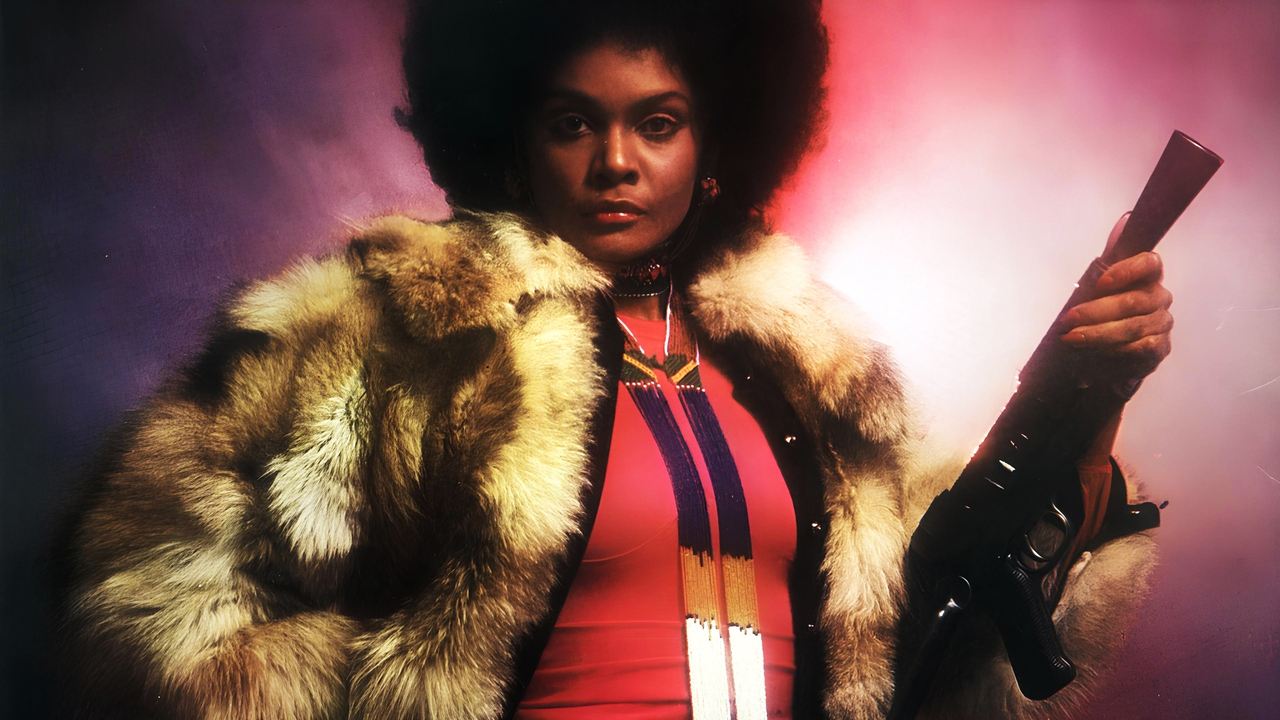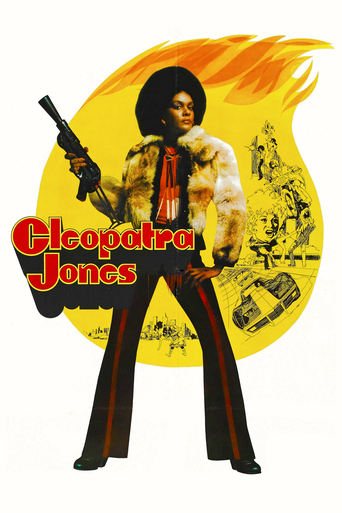

This film sure has a lot of familiar faces--Bernie Casey, Antonio Fargas, Shelly Winters (as "Mommy"), Esther Role and even Don Cornelius (from "Soul Train") are all here to support Tamara Dobson as Cleopatra Jones. Cleopatra is an extra-special narcotics agent--practically James Bond and a DEA officer combined! She knows martial arts, carries a machine gun, drives like a NASCAR driver AND manages to look hot on top of everything else! It seems that Cleo's efforts have begun to hurt Mommy's businesses and those of her associates--especially Fargas' drug dealing. So, it's the mob against Cleopatra. Considering it's only 682 to 1, it's reasonably certain that Cleo will be victorious by the end of the film.This movie has some similarities to COFFY and FOXY BROWN, as all three films are about an angry woman's attack on the drug trade. One major difference was that in these two Pam Greer films, the title character wasn't a special agent--just a vigilante wanting to rid the world of dope fiends. Dobson, unlike most other blaxploitation heroes works for "the Man"! Another difference is that Ms. Dobson manages to keep her clothes on throughout the film! The final difference is that, believe it or not, Greer's films were a lot more believable, as Dobson can do ANYTHING and is practically Wonderwoman--whereas, Greer is just really, really mad!! Heck, one of the victims even calls Dobson "Wonderwoman"!Overall, this film is far less gritty blaxploitation and more like an episode of "Get Christie Love" or "Charlie's Angels"--the music, the plot, the acting--the whole package. I wonder if Aaron Spelling had anything to do with this project!!
... View MoreThough this entry into the "tough black chick" subgenre of 70's Blaxploitation doesn't feature the undisputed queen Pam Grier, it's sure to live on, thanks to the bizarre presence of two-time Oscar winner Winters as the colorful antagonist. Dobson, a true Amazon if there ever was one, plays a larger than life Federal agent who does everything in her power to rid the streets of illegal drugs and stop the trafficking at its source. She is shown at the start of the film ordering a massive poppy field to be burned. This ticks off drug queen Winters who proceeds to declare war on Dobson. Meanwhile, a shelter for reforming druggies, run by Dobson's beau Casey, is targeted by some over-eager members of the police force, chiefly nasty, racist McKinney. Also stirred into the mix is streetwise pusher Fargas, who reports to Winters, but would like his own territory. The various factions take each other on, frequently betraying one another until Dobson has to face down Winters in a campy finale. Dobson, a towering presence draped in designer clothes and furs who drives a mean corvette, is not a particularly strong actress, but she makes an unforgettable visual impression. Unusual for this type of film, she works hand in hand with the law, though she isn't afraid to branch out on her own when she wants to. Casey adds a nice dose of reality and concern into his role. He's basically got the "girlfriend" role, but he and Dobson make a nice couple. Winters is way, way out there, abandoning all subtlety. Sporting a series of garish wigs, most of them vibrant red, she wails and rails at everyone around her when she isn't fondling her female assistants. It's a shrill, outrageous performance, but she's never boring. Fargas is engagingly flamboyant. He would later play a lighter variation on this type of role (and others he specialized in during this time) on "Starsky & Hutch." Sykes appears as his main squeeze. She sings (badly) and makes almost no impression at all until the end when she registers fear and despair fairly well. Frazer is authentic as a police captain. He would essay similar roles on "Kojak" and "As the World Turns." McKinney, legendary as the depraved hillbilly rapist in "Deliverance", gives another effectively nasty performance here. Reportedly, he was quite a caring and considerate man in real life! Other familiar faces include Warren as a motocross racer, Rolle as a soul food restaurant owner and Popwell (notable for his roles in the "Dirty Harry" films) as one of Rolle's adventuresome sons. This film remains one of the less graphically violent and sexually exploitive of the genre and, on that point, may disappoint some viewers. Still, it's got decent music, acceptable production values, interesting locales and costumes and some snappy dialogue. This was likely one of the films that inspired the short-lived TV series "Get Christie Love" (a show that was partly derailed when its star Teresa Graves got religion and refused to do most of what her character was intended to do as a focal point of the series!)
... View MoreI suppose that as a conservative, I should give this movie points for avoiding the normal anti-establishment "blaxploitation" theme (you can't get much more establishment than being a federal agent during the Nixon Administration) and showing blacks working within the system to effect change.But I can't.The only thing that makes John Shaft the cultural icon that he is, is the fact that he was meant to frighten middle-class white people. Without the whole "black man standing up to whitey's system" aspect, *Shaft* is just another dime-a-dozen, derivative private-eye flick (and the sex scenes, effective in the 70s as a play on the "oversexed black man" stereotype, seem pretty sleazy now).And *Cleopatra Jones* is just another dime-a-dozen, derivative supercop flick. Here, the "black thing" is merely a gimmick. It could have been made with an all-white cast with very few changes.Even considered purely as an action movie, it fails. Even the cool car chase has some editing problems, and Tamara Dobson, though a stunningly beautiful woman, simply doesn't have the moves for the fight scenes.About the only really enjoyable scenes are those involving Doodlebug (Antonio "Huggy Bear" Fargas) and his henchmen.
... View MoreWhile it is pitiful black exploitation as we view with 20/20 hindsight, this film marked another of H*wood's strenuous efforts to embrace black actors and actresses on the silver screen. In today's view the glam outfits look ridiculous, but then if you walked the streets in the 70's, the outfits and characters might easily be a collage of reality. Big afros and "to the max" jackets are all hallmarks of the 1970's American style--especially, the Black neighborhood.The metaphorical message means much when taken in its contextual setting. Blacks were fighting for their neighborhoods against the onslaught of "urban renewal" and infestation of drug dealers and pimps, which compared to the 80's now seem a 'walk in the park'. It could be classed as some morality play--where combatants take on the role of the nemesis in reality and the heroine becomes the overcoming and empowered victims in reality.It's "fly".
... View More